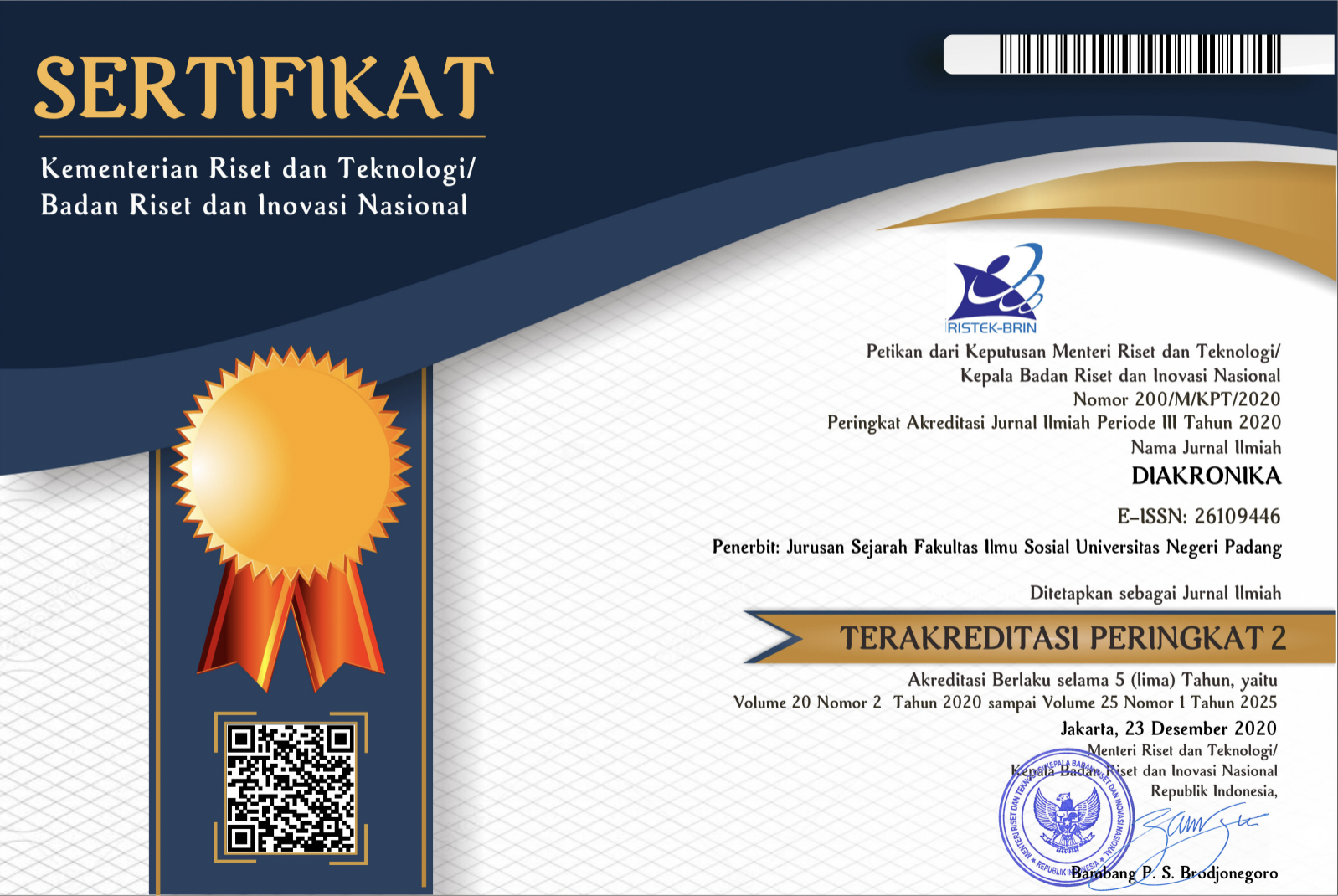Enhancing Historical Understanding through Local Wisdom Based Learning: A Case Study in Senior High Schools
Abstract
In the growing concern over students’ detachment from historical content and the weakening of cultural identity, contextualizing history education through local wisdom emerges as a pedagogical imperative. This study explores how integrating local wisdom into history education can enhance student engagement, historical comprehension, and emotional connection to the subject at SMA N Kota Pontianak. Using a qualitative case study approach, data were collected through classroom observations, teacher interviews, and student reflections. The results demonstrate that local wisdom-based learning enriches historical understanding by linking curriculum content to students’ cultural heritage through folklore, oral traditions, and community narratives. Students showed increased motivation, active participation, and a stronger emotional bond with historical topics, reinforcing their cultural pride and sense of identity. While aligning with existing research on contextual learning, this study offers a novel contribution by examining the affective dimension of learning and its implementation in a multicultural, local Indonesian context. It highlights the strategic role of teachers in adapting local narratives into history lessons. It underscores the pedagogical value of local wisdom for fostering critical thinking, cultural awareness, and identity-based meaning-making. Despite challenges such as limited teaching resources and diverse interpretations of local traditions, the study concludes that local wisdom-based learning represents a powerful approach to revitalizing history education. It recommends that curriculum developers and educators systematically integrate local wisdom to promote more relevant, reflective, and inclusive learning experiences.
Downloads
References
Creswell, J. (2016). Introducing Qualitative Designs. In 30 Essential Skills for the Qualitative Researcher. http://e.pub/8y1g2myyze0jdol8znd4.vbk/OEBPS/s9781483398952.i1798-print-15411267...
Creswell, J. W., & Creswell, J. D. (2018). Research design: Qualitative, quantitative, and mixed methods approaches (Fifth Edition). Sage.
Effendi, T. D. (2019). Local Wisdom-based Environmental Education through Kikigaki Method : Japan Experience and Lesson for Indonesia Local Wisdom-based Environmental Education through Kikigaki Method : Japan Experience and Lesson for Indonesia. IOP Conf. Series: Earth and Environmental Science 239, 1–7. https://doi.org/10.1088/1755-1315/239/1/012038
Gay, G. (2010). Culturally responsive teaching: Theory, research, and practice (2nd ed). Teachers College Press.
Jumriani, Mutiani, Putra, M. A. H., Syaharuddin, & Abbas, E. W. (2021). The Urgency of Local Wisdom Content in Social Studies Learning : Literature Review. The Innovation of Social Studies Journal, 2((2) March), 103–109. https://doi.org/https://doi.org/10.20527
Mangkhang, C. (2022). Area-Based Participatory Action Learning of Social Studies Pre-service Teachers to Develop Indigenous History Learning Resources for Diversity Students in Northern Thailand. Higher Education Studies, 12(2), 20–34. https://doi.org/10.5539/hes.v12n2p20
Matitaputty, J. K., Saputra, N., Judijanto, L., Susanto, N., Hanif, M., Sopacua, J., & Fadli, M. R. (2024). PjBL-based digital history model to improve historical concept skills and historical consciousness. Journal of Education and Learning (EduLearn), 18(2), 430–440. https://doi.org/10.11591/edulearn.v18i2.21152
Miles, M. B., Huberman, A. M., & Saldana, J. (2014). Qualitative Data Analysis A Methods Sourcebook. In Sustainability (Switzerland) (Third Edit). Sage Publications, Inc. http://scioteca.caf.com/bitstream/handle/123456789/1091/RED2017-Eng-8ene.pdf?sequence=12&isAllowed=y%0Ahttp://dx.doi.org/10.1016/j.regsciurbeco.2008.06.005%0Ahttps://www.researchgate.net/publication/305320484_SISTEM_PEMBETUNGAN_TERPUSAT_STRATEGI_MELESTARI
Muhammad, U. A., Fuad, M., Ariyani, F., & Suyanto, E. (2022). Bibliometric analysis of local wisdom-based learning : Direction for future history education research. International Journal of Evaluation and Research in Education (IJERE), 11(4), 2209–2222. https://doi.org/10.11591/ijere.v11i4.23547
Neuman, W. L. (2014). Social Research Methods: Qualitative and Quantitative Approaches (Pearson Education Limited). MA: Allyn and Bacon.
Nordgren, K., & Johansson, M. (2015). Intercultural historical learning: a conceptual framework. Journal of Curriculum Studies, 47(1), 1–25. https://doi.org/10.1080/00220272.2014.956795
Ofianto, Rahmi, U., Syafrini, D., & Ningsih, T. Z. (2024). Assessing historical thinking skills in high school history education : a Padlet-based approach. Journal of Education and Learning (EduLearn), 18(3), 881–892. https://doi.org/10.11591/edulearn.v18i3.21260
Pangsuma, N. S., Nurahman, A. A., Riandi, R., & Solihat, R. (2024). Innovation of ESD Learning Module ( Education for Sustainable Development ) Based on Bugis Local Wisdom for Critical Thinking Skills and Environmental Literacy. Journal of Science Learning, 7(3), 257–266. https://doi.org/10.17509/jsl.v7i3.71247
Pratama, R. A., Pratiwi, I. M., Saputra, M. A., & Sumargono. (2022). Integration of STEM education in history learning. International Journal of Evaluation and Research in Education (IJERE), 11(1), 313~320. https://doi.org/10.11591/ijere.v11i1.22064
Purwanto, J. (2022). Efforts to Improve Local Wisdom Culture and History Learning Outcomes with Problem-Based Learning Methods in Senior High School. HISTORIA: Jurnal Program Studi Pendidikan Sejarah, 10(2), 169. https://doi.org/10.24127/hj.v10i2.4794
Putri, A. E. (2024). Optimizing History Learning Through Integration Of Digital Resources In High School. Jurnal Scientia, 13(02), 2216–2225.
Rusvitaningrum, Y., S, L. A., & Sudiyanto, S. (2018). Strengthening Students’ Historical Awareness in History Learning in High School Through Inquiry Method. International Journal of Multicultural and Multireligious Understanding, 5(5), 249. https://doi.org/10.18415/ijmmu.v5i5.446
Saripudin, D., Fauzi, W. I., & Nugraha, E. (2021). The Development of an Interactive E-Book of Local History for Senior High School in Improving Local Wisdom and Digital Literacy. European Journal of Educational Research, 11(1), 17–31. https://doi.org/https://doi.org/10.12973/eu-jer.11.1.17
Sayono, J., Jauhari, N., Ayundasari, L., & Sulistyo, W. D. (2020). Development of Projo Bale Model Based on Android Application in Malang's History and Local Wisdom Studies. International Journal of Emerging Technologies in Learning (IJET), 15(7), 4–16. https://doi.org/https://doi.org/10.3991/ijet.v15i07.13219
Uge, S., Neolaka, A., & Yasin, M. (2019). Development of social studies learning model based on local wisdom in improving students’ knowledge and social attitude. International Journal of Instruction, 12(3), 375–388. https://doi.org/10.29333/iji.2019.12323a
VanSledright, 1 B. A. (2014). Historical thinking is not a natural act: Preparing students for historical inquiry. Teachers College Press.
Wewengkang, N. D., Rahmat, Rohim, Saefuddin, Ramadhan, I., & Al-Amin. (2024). Development of E-Comic Teaching Materials with a Local Wisdom Theme to Enhance High School Students’ s Historical Awareness. Al-Ishlah: Jurnal Pendidikan, 16(4), 4323–4335. https://doi.org/10.35445/alishlah.v16i4.5974
Wibowo, S., Wangid, M. N., & Firdaus, F. M. (2025). The relevance of Vygotsky’s constructivism learning theory with the differentiated learning primary schools. Journal of Education and Learning, 19(1), 431–440. https://doi.org/10.11591/edulearn.v19i1.21197
Wineburg, S. (2001). Historical Thinking and Other Unnatural Acts: Charting the Future of Teaching the Past (Critical Perspectives on The Past). PA: Temple University Press.
Yasir, M., Hartiningsih, T., & Rahma, A. A. (2024). The influence of local wisdom-based science learning on the cultural heritage conservation character. Research and Development in Education (RaDEn), 4(2), 1418–1434. https://doi.org/https://doi.org/10.22219/raden.v4i2.36737
Yefterson, R. B., Ningsih, T. Z., & Syahputra, M. A. D. (2024). Local wisdom-based assessment of historical thinking skills : Developing and testing an instrument for junior high school students. Edelweiss Applied Science and Technology, 8(5), 892–913. https://doi.org/10.55214/25768484.v8i5.1792





